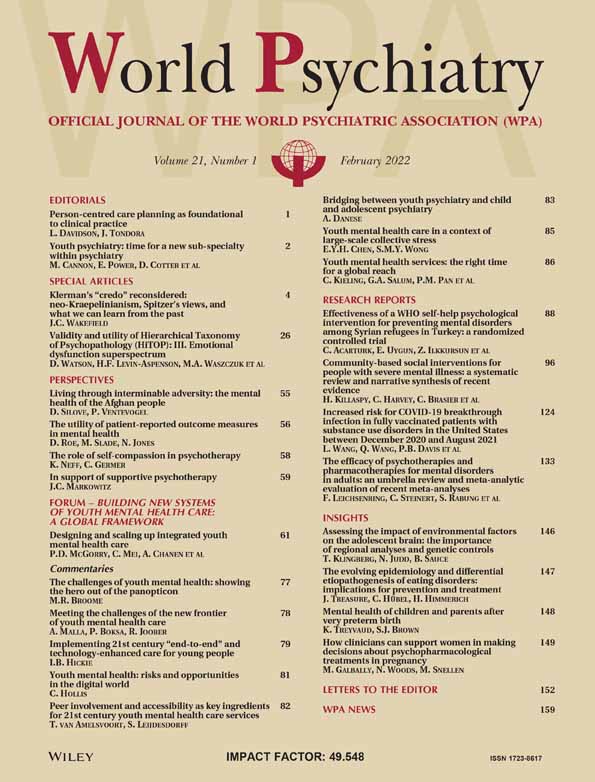妇女生殖心理健康:现有证据和今后的研究、临床实践和卫生政策方向。
IF 65.8
1区 医学
Q1 Medicine
引用次数: 0
摘要
精神障碍流行病学中的性别和性别差异有充分的文献记载。人们对这些差异的驱动因素了解较少。生殖健康是影响妇女一生的心理健康的性别决定因素之一。在本文中,我们回顾了可能与精神疾病相关的常见生殖事件,包括月经(经前焦虑症首次出现在最近的精神障碍分类中)、避孕、堕胎、性功能障碍、性欲亢进、性暴力、生殖强迫、不孕症和相关妇科疾病,以及更年期。这种生殖事件可能通过一系列潜在的生物和社会心理机制对全球妇女产生不同的影响。例如,在整个月经周期中,易受激素水平生理变化的影响;精神障碍治疗的副作用;导致子宫内膜异位症、多囊卵巢综合征以及抑郁症等精神障碍的炎症;与性别劣势的交叉点表现为在获得月经产品和卫生设施、避孕和堕胎方面的结构性障碍,突出了影响妇女心理健康的更广泛的社会决定因素。对这些机制的进一步了解正在指导制定有效的干预措施,本文也将对此进行综述。然而,关键的证据差距仍然存在,部分原因是精神卫生研究中历史上的性别偏见,以及临床实践中对生殖健康的忽视。此外,虽然国际上最近提出了若干妇女健康战略,但这些战略通常不包括对整个生命过程中的心理健康的关注,特别是对患有严重精神疾病的妇女。将共同设计的生殖健康干预措施纳入初级和二级精神保健环境,提供量身定制的护理,增加有效干预措施的证据基础,增强妇女对其生殖健康做出知情选择的能力,不仅可以改善生殖健康,还可以改善妇女整个生命过程中的心理健康。本文章由计算机程序翻译,如有差异,请以英文原文为准。
Women's reproductive mental health: currently available evidence and future directions for research, clinical practice and health policy.
Sex and gender differences in the epidemiology of mental disorders are well documented. Less well understood are the drivers of these differences. Reproductive health represents one of the gendered determinants of mental health that may affect women throughout their life course. In this paper, we review common reproductive events that may be associated with mental ill health, including menstruation (with premenstrual dysphoric disorder appearing for the first time in recent classifications of mental disorders), contraception, abortion, sexual dysfunction, hypersexuality, sexual violence, reproductive coercion, infertility and associated gynaecological conditions, and menopause. Such reproductive events may differentially affect women globally via a range of potential biological and psychosocial mechanisms. These include, for example, vulnerability to the physiological changes in hormone levels across the menstrual cycle; side effects of treatment of mental disorders; inflammation underpinning endometriosis and polycystic ovarian syndrome as well as mental disorders such as depression; intersections with gender disadvantage manifesting, for example, as structural barriers in accessing menstrual products and sanitation, contraception and abortion, underscoring the broader social determinants impacting women's mental health. Greater understanding of these mechanisms is guiding the development of effective interventions, which are also reviewed here. However, key evidence gaps remain, partly as a result of the historic gender bias in mental health research, and the neglect of reproductive health in clinical practice. Furthermore, while several women's health strategies have recently been proposed internationally, they do not usually include a focus on mental health across the life course, particularly for women with severe mental illness. Integrating co-designed reproductive health interventions into primary and secondary mental health care settings, providing tailored care, increasing the evidence base on effective interventions, and empowering women to make informed choices about their reproductive health, could improve not only reproductive health but also women's mental health across the life course.
求助全文
通过发布文献求助,成功后即可免费获取论文全文。
去求助
来源期刊

World Psychiatry
Nursing-Psychiatric Mental Health
CiteScore
64.10
自引率
7.40%
发文量
124
期刊介绍:
World Psychiatry is the official journal of the World Psychiatric Association. It aims to disseminate information on significant clinical, service, and research developments in the mental health field.
World Psychiatry is published three times per year and is sent free of charge to psychiatrists.The recipient psychiatrists' names and addresses are provided by WPA member societies and sections.The language used in the journal is designed to be understandable by the majority of mental health professionals worldwide.
 求助内容:
求助内容: 应助结果提醒方式:
应助结果提醒方式:


